Can Pet Birds Safely Enjoy Apples in Their Diet?
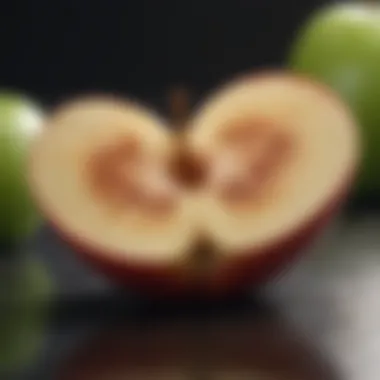
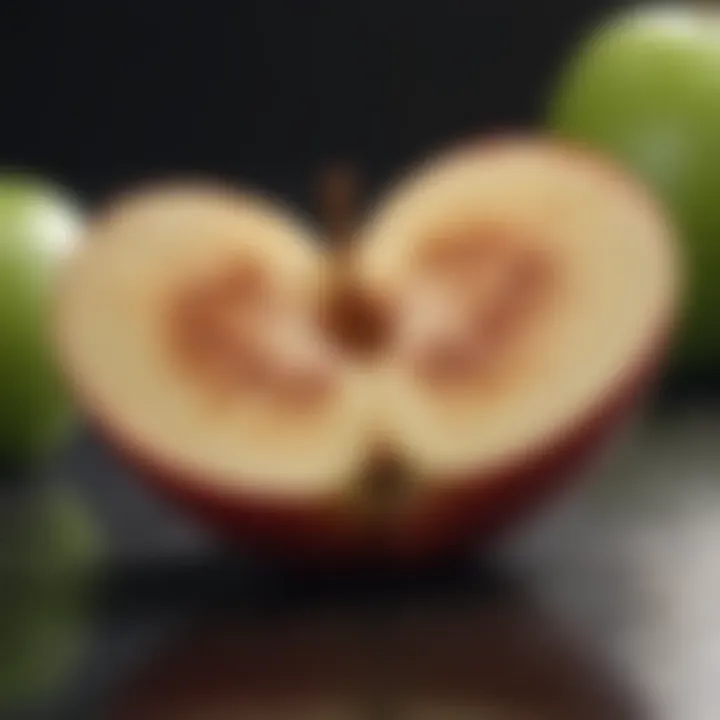
Intro
When it comes to feeding pet birds, it’s easy to assume that all fruits are good for them, but the reality is a bit more complex, especially when one considers apples in the mix. Apples are often seen as a healthy snack for humans, but can they hold the same status for our avian companions? This article will delve into whether pet birds can safely enjoy apples as part of their diet, shedding light on nutritional benefits, risks, and practical tips for preparation and serving.
The world of pet bird nutrition is vast and often confusing. While apples are generally a popular fruit in many households, understanding their specific implications for birds requires more than just surface knowledge. Each bird species comes with its own set of dietary needs and appetites. Given these nuances, it's crucial for bird owners to be equipped with the right tools to make informed decisions about their feathered friends' diets. This involves assessments of not just what is good nourishment but also what might pose a threat to their health.
In the following sections, we will explore a comprehensive guide to incorporating apples into your pet bird's diet safely, ensuring that dietary habits foster a happy and healthy lifestyle. We'll tackle the basics of bird care, interactions, emotional well-being, health and safety, and even some fun facts. Let’s not waste any time and jump right in!
Preface to Avian Nutrition
Understanding avian nutrition is a fundamental aspect of responsible bird ownership. Pet birds, much like us, require a balanced diet consisting of various nutrients to maintain their health and vitality. A well-rounded diet not only supports bodily functions but also affects their behavior, lifespan, and overall happiness. As such, anyone considering a pet bird should take a deep dive into the essentials of what these creatures need beyond just birdseed.
Birds are often perceived as easy pets, but the truth is that their dietary needs can be quite intricate. For example, many pet owners might assume that a simple mix of seeds is adequate, but that falls woefully short. The .right combination of grains, veggies, and fruits plays a critical role in their well-being. Failing to provide a varied diet could lead to nutritional deficiencies, resulting in serious health issues.
In this context, fruits—including apples—become a hot topic. They aren’t just tasty; they also offer vital vitamins and minerals. The challenge, however, lies in understanding how to safely incorporate these fruits into a bird's diet without jeopardizing their health.
Understanding the Basics of Bird Diets
At the heart of bird nutrition is the concept of a balanced diet, which mirrors the very essence of bird foraging in the wild. Birds are naturally opportunistic feeders, which means they will eat a variety of food sources, giving rise to unique dietary needs depending on the species. For instance, parrots thrive on a mix of seeds, nuts, fruits, and veggies, while finches might stick to seeds primarily.
Most birds’ diets can generally be classified into three main categories:
- Seeds and Grains: These form the core diet and provide essential calories and fats.
- Fruits and Vegetables: This is where the nutrients come into play! Fruits are often high in water content, vitamins, and antioxidants that are vital for health.
- Protein Sources: This includes insects or legumes, important especially for breeding or molting birds.
Each bird species has its peculiar requirements. Failure to recognize this diversity can lead to dietary oversights, paving the path to long-term health problems. Think of it as painting a detailed picture; only by choosing the right colors— in this case, diverse food options—can one achieve a vibrant masterpiece.
The Role of Fruits in Avian Diets
Now, let’s focus on the role fruits play in our feathered friends' meals. Fruits are indisputable superstars in the avian diet, offering hydration and a myriad of health benefits. They provide not only taste but are also loaded with vitamins A and C, potassium, and a range of antioxidants.
However, not all fruits are created equal. Birds often gravitate toward specific sweet treats, and apples are among the favorites. The juicy sweetness of an apple can entice even the pickiest avian eaters. But here’s a heads-up: moderation is key. While fruits are an essential component of an avian diet, they should ideally make up about 10-15% of a bird's total food intake. Overdoing it could lead to issues such as obesity or sugar-related health problems.
When looking at apples specifically, it’s their fibrous texture and refreshing flavor that make them a go-to option. Yet, bird owners must remain vigilant, ensuring that the seeds are removed and that the fruit is prepared correctly. Apples can serve as a beneficial supplement to the main diet when given appropriately. They highlight the idea that variety in flavor and texture is just as important in a bird's diet, as it is in human meals. Feeding these fruits introduces a delightful twist to their daily grub, making mealtime a more enjoyable experience for pet birds.
Nutritional Profile of Apples
When considering the diets of our feathered friends, understanding the nutritional content of various foods is imperative. Apples, often a staple in human diets, carry a special significance when included in avian nutrition. It is not just about tossing a slice of fruit into the cage; rather, knowing the comprehensive nutritional profile of apples helps pet bird owners make informed choices.
Apples are rich in multiple vitamins and minerals, making them an excellent candidate for a balanced diet. Their low-calorie profile coupled with an enriching mix of essential nutrients offers specific health benefits, especially for birds that may struggle with obesity or other diet-related issues.
Additionally, the consumption of apples can spark interest in fresh produce, which is crucial if you're trying to encourage your pet bird to diversify its palate. When done right, incorporating apples can enhance the overall quality of an avian diet without inadvertently introducing potential health hazards.
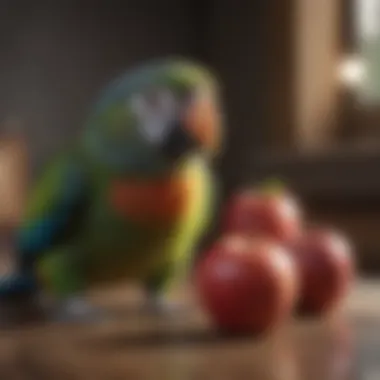
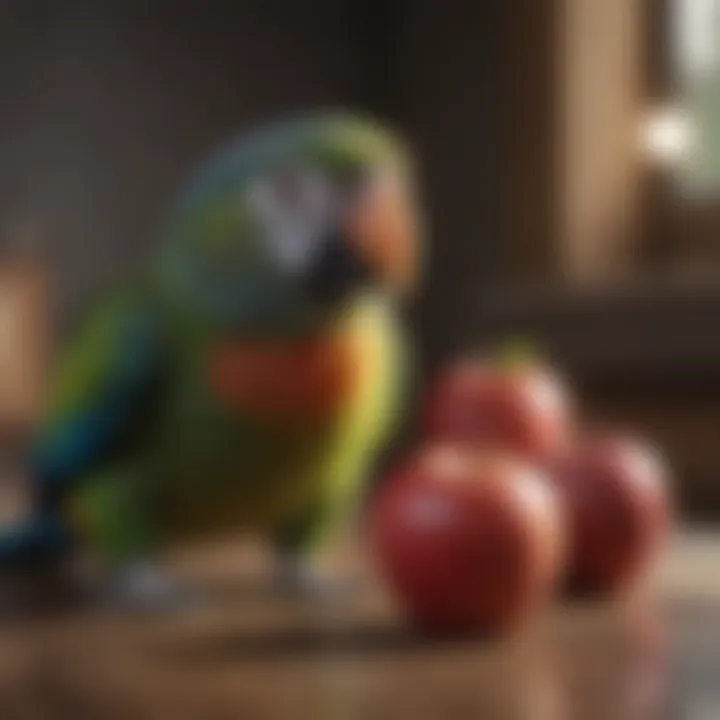
In the following subsections, we'll delve deeper into the specific vitamins and minerals found in apples, as well as exploring the role of antioxidants. Understanding these elements will empower bird owners to thoughtfully integrate apples into their pets' diets.
Vitamins and Minerals Present in Apples
Apples pack a punch when it comes to vitamins and minerals beneficial for birds. Notably, they are a solid source of Vitamin C, offering an immunity boost that helps keep illnesses at bay. Vitamin C plays a role in collagen production, aiding the health of feathers and skin.
Furthermore, apples contain small but significant amounts of Vitamin A, which can be crucial for maintaining healthy eyesight in birds. B vitamins, such as riboflavin and niacin, are present too; these contribute to energy metabolism and overall feather health. While the amounts may vary between different apple varieties, it’s safe to say that incorporating apples can bring about considerable advantages to your bird’s diet.
Some important minerals are also found in apples. Potassium is abundant in these fruits, which supports proper muscle function and heart health. In essence, apples promote a well-rounded array of nutrients that can enhance your pet bird's overall health.
Antioxidants and Their Importance
Antioxidants are the unsung heroes in the dietary profiles of many foods, and apples are no exception. These compounds play a pivotal role in combating oxidative stress, which can lead to cellular damage over time. For our pet birds, who may be exposed to various environmental stresses, including pollution or health decline, incorporating antioxidant-rich foods like apples might be particularly beneficial.
Apple skins are especially loaded with antioxidants like quercetin, which has been linked to anti-inflammatory properties. This means feeding apples can contribute to your bird’s long-term health by potentially reducing the risk of chronic diseases.
Moreover, the polyphenols found in apples are thought to support cardiovascular health. Considering that heart issues can be prevalent in domesticated birds, feeding them antioxidant-heavy foods is a proactive approach for any bird owner.
In summary, understanding the vitamins, minerals, and antioxidants in apples paints a clear picture of how beneficial this fruit can be for pet birds, provided it's safely prepared and served. These nutrients not only enhance the birds' health but also contribute to their overall vitality.
Potential Risks of Feeding Apples to Birds
Incorporating apples into your pet bird's diet may seem like a straightforward choice, but understanding the potential risks is crucial. Many bird owners rush to offer their feathered friends this juicy fruit without considering its effects. This section delves into key risks associated with feeding apples to birds, focusing on specific factors that can affect their health and well-being. It’s essential to be aware of these pitfalls, allowing you to make informed decisions that benefit your avian companions.
Apple Seeds and Toxicity
First and foremost, let’s tackle the matter of apple seeds. These little seeds contain amygdalin, a compound that can release cyanide when metabolized. Although a pet bird would need to consume a significant number of seeds for it to cause toxicity, it is a risk best avoided. It’s crucial to ensure that any apple slices you give don’t include seeds.
Even small quantities could potentially be harmful if consumed regularly. In fact, bird owners should be diligent— even the best-laid plans can sometimes go awry. Always remove the seeds and core before serving apples to ensure complete safety. Your pet deserves only the safest treats!
The Impact of Sugar Content
Next up is the sugar content in apples. While fruits can be a delightful treat, they also pose challenges with their natural sugars. Unlike many mammals, birds don’t process sugar in the same way. Too much sugar can lead to obesity and related health issues such as fatty liver disease.
To mitigate these risks, it’s wise to restrict serving sizes. A thin slice or two is sufficient, especially if your bird has a history of weight issues. Remember, moderation is the name of the game. Instead of making apples a staple, think of them as an occasional treat. A balanced diet should emphasize more nutrient-dense items while ensuring that fruits like apples are enjoyed without tipping the scales.
Allergic Reactions in Birds
Lastly, there’s the concern of allergic reactions. Some birds can be sensitive— or even allergic— to different foods, including fruits like apples. A reaction might manifest as digestive issues or even changes in behavior. Signs of discomfort should never be taken lightly. If you notice any unusual reactions after introducing apples into your bird's diet, it’s crucial to stop feeding them immediately. You may want to discuss this with your avian veterinarian to rule out any serious conditions.
Key Takeaway: While apples are generally safe for birds, the seeds pose toxicity risks, high sugar content can lead to obesity, and allergic reactions should never be overlooked. Educated decisions based on understanding these risks can make a world of difference for your pet’s health.

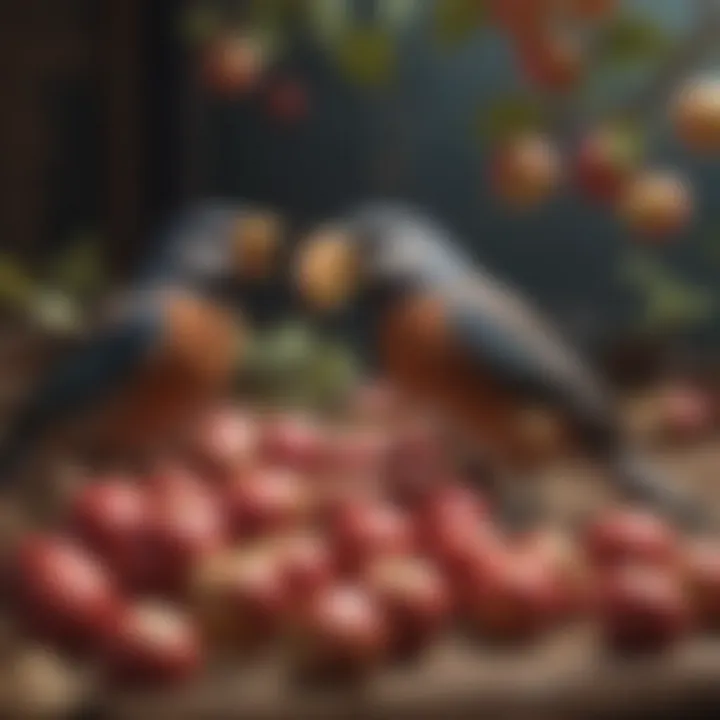
Guidelines for Feeding Apples to Birds
Understanding how to properly include apples in a pet bird's diet is crucial for several reasons. Apples are often lauded for their health benefits, but they must be introduced carefully into avian diets. It’s not just about tossing a piece of fruit into the cage. The way apples are handled and presented can dramatically affect the bird's health and enjoyment. Therefore, these guidelines serve as a roadmap for bird owners to ensure they’re not only feeding their feathered friends tasty treats but also prioritizing their overall well-being.
Preparing Apples for Your Pet Bird
Choosing Organic Over Conventional
When it comes to feeding apples to your bird, opting for organic fruit is something many owners should consider seriously. Organic apples are cultivated without the use of synthetic pesticides or herbicides, which can be harmful to birds. Birds have sensitive systems, and exposure to these chemicals might lead to health issues down the line.
Moreover, organic fruits have a richer, more robust flavor profile due to the natural growing methods, making them more appealing to birds. The unique feature of organic fruit is that it tends to have a higher nutritional density. While they may cost a bit more, this investment can foster a healthier diet for your pet and one that is less prone to contaminants.
Importance of Washing Apples Thoroughly
Washing apples before feeding them to your pet bird cannot be overstated. Just because a fruit looks clean does not mean it is. Residues from pesticides, dirt, and potential mold can linger on their skins. A thorough wash not only helps remove these elements but also makes the fruit more appealing for your bird.
By rinsing apples under running water and scrubbing them gently with a vegetable brush, you can significantly reduce potential risks. This practice not only keeps your bird safe but also refreshes the apple, ensuring it’s crisp and delectable. A simple wash can prevent health complications that could stem from unclean food. So, never skip this step. The benefits outweigh the time it takes, ensuring your bird enjoys only the freshest and safest produce.
Serving Sizes and Frequency
When it comes to portion control, moderation is the name of the game. Apples, while nutritious, also contain sugar. It’s important to pay attention to serving sizes and how often they are introduced into your bird’s diet. A small slice or two a few times a week is generally recommended, depending on the species of bird.
Also, consider the overall balance of their diet. Apples should complement the main diet of pellets and seeds, not replace them. Keep an eye on your bird's reaction; if your bird seems more energetic or shows preference towards apples, that could be a good indicator that you’re on the right track with portions.
In essence, preparing apples thoughtfully and serving them mindfully can vastly enrich the experience for your feathered companions, giving them a delightful addition to their diets while ensuring their safety and health.
Other Fruit Options for Pet Birds
Incorporating a variety of fruits into a pet bird's diet does not only add flavor but also enhances their overall health. While apples may take the spotlight for their sweetness and crunch, they are just a piece of the larger fruit puzzle. Birds, like little eating machines, thrive on a balanced diet that includes a medley of fruits to meet their nutritional needs. It's crucial to explore different options available to ensure that our feathered friends get a well-rounded intake of vitamins, minerals, and antioxidants.
Comparative Analysis of Common Fruits
When considering fruits for birds, not all choices are created equal. Some fruits pack a nutrient punch, while others should be served cautiously. Here's a quick rundown:
- Bananas: High in potassium, bananas are great for energy but should be given in moderation due to their high sugar content.
- Berries (strawberries, blueberries, raspberries): These are little powerhouses of antioxidants and vitamins A and C. They can help strengthen the immune system and are low in calories.
- Citrus Fruits (oranges, lemons): A stellar source of vitamin C, citrus fruits can offer birds a refreshing dose of tartness. However, too much acidity may upset some birds’ stomachs.
- Pineapple: Rich in bromelain, pineapple is excellent for digestion and provides an exciting taste change. Still, the sugar levels can be a concern for regular feeding.
- Grapes: Sweet and hydrating, grapes should be halved to prevent choking, but like bananas, are quite sugary.
Bird owners must think twice before tossing a plate of fruit into the cage. Pay attention to each fruit's effects on your particular species. Some birds may react poorly to certain types, so introducing new fruits gradually can help monitor for any adverse reactions.
Creating a Balanced Fruit Diet
A balanced fruit diet isn't just a hodgepodge of what’s available; it takes planning and observation. To create nutrient variety, consider these steps:


- Diversify With Fresh Options: Aim to offer at least three different types of fruits each week. This variety will help cover the different nutritional bases.
- Watch Portion Sizes: Even though fruits are healthy, they can still be high in sugar. Offer up fruit in small pieces, ideally no more than a few ounces a day depending on their overall diet.
- Focus on Seasonality: Seasonal fruits can be more nutritious at their peak ripeness and may help adjust your bird’s dietary routine. Explore local markets to find fresh options.
- Observe Preference: Some birds are picky munchers. Take note of which fruits they enjoy and which they tend to avoid. This insight can help tailor their meals more effectively.
- Consult Resources: Tap into communities such as Reddit or Facebook groups where other bird owners share their experiences. Sometimes firsthand accounts of what works can guide you in making better choices.
The right fruit choices can transform your pet's meals from mundane to delightful, while ensuring they receive essential nutrients crucial for their vitality.
Taking into account these factors will ensure that your pet bird reaps the benefits from the lovely world of fruits while maintaining a balanced diet. The goal, after all, is not just to fill their bellies but to foster their overall well-being.
Observing Bird Reactions to New Foods
Introducing new foods to pet birds is akin to walking a tightrope; it requires a delicate balance of curiosity and caution. Birds are creatures of habit, often clinging to their familiar foods. This underscores the importance of monitoring their reactions as they venture into the realm of new diets, such as apples. By closely observing these behaviors, owners can adapt their feeding strategies to either encourage exploration or reconsider their choices.
Signs of Preference or Aversion
Understanding how a bird reacts to a new food is pivotal. It gives insight not just into their likes and dislikes, but also highlights their comfort level with different textures and flavors. Here are some clear signs to look out for:
- Eager Exploration: When a bird approaches a new food with a sense of curiosity, pecking at it or inspecting it closely, it generally shows interest.
- Tentative Nibbles: Initial, cautious tasting often indicates a willingness to try. If they take a bite but seem unsure, it may point towards a gradual acceptance of the new food.
- Complete Disinterest: If your feathered friend simply turns its beak away or ignores the food altogether, it’s a clear sign that they might not be sold on apples.
- Positive Vocalizations: Birds often express pleasure through chirps or whistles when they enjoy something. Listen for these happy sounds!
This observation turns you into an avian detective, piecing together the preferences of your pet.
Gradual Preamble of New Foods
Bringing new foods into a bird’s diet doesn’t happen overnight, nor should it. A gradual introduction is not only kinder on their digestive systems but also provides a smoother transition. Here’s how to approach it:
- Start Small: Begin with tiny pieces of apple, preferably without seeds. Offering a small portion allows your bird to test its response without overwhelming them.
- Mixing It Up: If your bird is accustomed to a specific diet, try incorporating apples into their favorite foods. This can spark interest—they may accept the apple if it’s paired with something familiar.
- Routine Matters: Introduce apples when your bird is most active or hungry. Timing can greatly influence their willingness to explore new tastes.
- Repetition and Patience: Don’t be discouraged if your bird snubs the apple initially. Repeated exposure over several days can help them develop a taste for it. Just be observant and take note of any improvements in their attitude toward the new food.
- Respect Their Limits: If a bird shows consistent aversion to the apple after a reasonable number of trials, it might just not be their cup of tea. It’s crucial to listen to their preferences, responding to their needs rather than pushing on with something they simply don’t enjoy.
"Birds communicate with the world through their behaviors—understanding them is the first step toward a well-rounded diet."
Ultimately, observing your pet bird's reactions to new foods not only enhances their diet but also strengthens the bond between you and your feathered companion.
Epilogue
In the grand tapestry of avian health, the inclusion of apples within a pet bird's diet serves as a noteworthy thread. While the article delves into the location of both the benefits and potential hazards, it establishes a clear pathway for bird owners to navigate this fruity territory. Apples bring a bevy of vitamins, minerals, and antioxidants that can enhance overall health, but awareness of risks, especially from seeds and sugar, remains essential.
When taking a step back to view the entirety of the article, the importance radiates from its educational framework. The meticulous guidelines on preparation and serving sizes not only cover how to introduce apples safely but also stress the significance of diversity in a pet bird's diet. After all, avian nutrition is not merely a checklist of edible items; it’s about creating a balanced menu that caters to the unique needs of different species.
In a nutshell, encouraging a variety of fruits, including apples, allows bird owners to foster an enriched environment that supports their pets' well-being. By being proactive and informed, bird aficionados can truly enhance the quality of life for their feathered friends while making every snack a delightful experience.
Summary of Key Points
- Nutritional Benefits: Apples provide significant nutrients, including vitamins A and C, that are vital for avian health.
- Potential Risks: Awareness of apple seeds and sugar content is crucial, as these elements can pose health risks to birds.
- Preparation Guidelines: Proper washing and selection of organic apples are advised to ensure safety.
- Importance of Variety: Incorporating a range of fruits alongside apples can lead to a healthier, more balanced diet for pet birds.
Encouraging Diverse Diets for Pet Birds
In the interconnected world of avian nutrition, encouraging a diverse diet plays a critical role in promoting health and longevity. Just like us, birds thrive on a variety of food sources – one-dimensional diets are rarely the way to go.
- Mix It Up: Regularly changing the fruits offered can help prevent boredom and ensure a range of nutrients. Beyond apples, think of other fruits like bananas, strawberries or oranges, each bringing unique vitamins to the table.
- Observe and Adjust: Watching how your bird reacts to different fruits is also key. Some may take to apples like a duck to water, while others might not care for the taste at all. Gradual introductions can illuminate preferences and aversions.
- Cultural Influences: Understanding that different breeds may have distinct dietary needs is another layer to consider. For instance, larger parakeets might handle fruit differently than a small finch, making feedback from diverse resources on bird care helpful — forums like reddit.com or even facebook groups can provide insights.
Ultimately, the journey toward optimal nutrition for your pet bird should be as engaging as it is educational. By embracing the nuances of what fruits like apples can offer, bird owners can elevate their companions' dining experiences and support their vibrant health.















